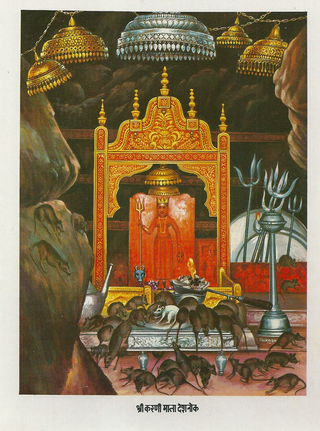
The Gelug is the newest of the four major schools of Tibetan Buddhism. It was founded by Je Tsongkhapa (1357–1419), a Tibetan philosopher, tantric yogi and lama and further expanded and developed by his disciples.

The Kadam school of Tibetan Buddhism was an 11th century Buddhist tradition founded by the great Bengali master Atiśa (982-1054) and his students like Dromtön (1005–1064), a Tibetan Buddhist lay master. The Kadampa stressed compassion, pure discipline and study.

Buddhism has been practiced in Japan since about the 6th century CE. Japanese Buddhism created many new Buddhist schools, and some schools are original to Japan and some are derived from Chinese Buddhist schools. Japanese Buddhism has had a major influence on Japanese society and culture and remains an influential aspect to this day.

Sōhei were Buddhist warrior monks of both classical and feudal Japan. At certain points in history, they held considerable power, obliging the imperial and military governments to collaborate.
Saṃsāra is a religious concept of reincarnation in Hinduism and other Indian religions.
Jati or JATI may refer to:

Karni Mata, known by various names such as Bhagwati, Mehaai, Jagdamba, and Kiniyani is a Hindu Goddess of power and victory described as a warrior sage, who lived between 14th to 16th century in Western Rajasthan. Karni Mata is the tutelary deity of the Rajputs and Charans of northwestern India. As a Sagati, she is also worshipped as an incarnation of Hinglaj or Durga. She is the official deity of the royal families of Bikaner and Jodhpur. Karniji played an important role in shaping the history of the region. She is intimately associated with the establishment of the Rajput hegemony in the region. With her blessings, Rao Jodha and Rao Bika founded new kingdoms of Jodhpur and Bikaner. At the request of the Maharajas of Bikaner and Jodhpur, she laid down the foundations of Bikaner Fort and Mehrangarh Fort, the two most important forts in the region. She lived an ascetic life and was widely revered during her own lifetime. Indian Army troops from the Marwar region also regard Karni Mata as their patron deity.
The Buddha is the popular name of Siddhartha Gautama, founder of Buddhism.

Haibutsu kishaku (廃仏毀釈) is a term that indicates a current of thought continuous in Japan's history which advocates the expulsion of Buddhism from Japan. More narrowly, it also indicates a particular historic movement and specific historic events based on that ideology which, during the Meiji Restoration, produced the destruction of Buddhist temples, images and texts, and the forced return to secular life of Buddhist monks. It is a yojijukugo phrase.
Dabhade is a Koli and Maratha clan found largely in Maharashtra, India. They were originally centered on Talegaon Dabhade, but became the Maratha chiefs of Gujarat. A family belonging to the Dabhade clan held the hereditary title of senapati (commander-in-chief) and several jagirs in Gujarat until 1751. That year, Umabai Dabhade and her relatives were arrested for a rebellion against the Peshwa, and were stripped of their titles.
The Kadam people inhabit Mount Kadam in Nakapiripirit District in the Karamoja sub-region, located in north-eastern Uganda.
Trimbak Rao Dabhade was a Senapati of Maratha empire during 1729–1731. He was the son of Khande Rao Dabhade and Umabai Dabhade.
This page is based on this
Wikipedia article Text is available under the
CC BY-SA 4.0 license; additional terms may apply.
Images, videos and audio are available under their respective licenses.





